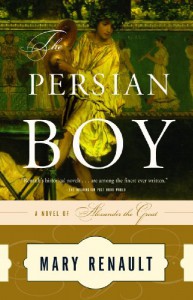Towers of Books Come Tumbling Down!
I love all kinds of books! For all my friends, I am known on GR as Alicja. I don't stick with a genre, that's boring. Instead you'll get reviews from the most random assortment of fiction and non-fiction works. It's probably due to my interests being as eclectic as my book tastes.
I'm a girlfriend-loving bisexual, science fiction geek, PC gamer, historical fiction devourer, hiker, atheist, history buff, opera lover, vegetarian, kayaker, metal and hard rock concert goer, science nerd, politics debater, world traveler, M/M romance fan, and I have the ability to transform from an adult-like hard-working professional into a screaming fangirl in five seconds flat.
The Persian Boy by Mary Renault

Rating: 5.5/5 (It was that briliant!)
Summary: This second (because it wouldn’t be like me to actually read books in their intended order, now would it?) in Renault’s trilogy about the life of Alexander the Great. This novel is told from the point of view of Bagoas, his lover and servant. Bagoas, Persian king Darius’ eunuch slave, was given to Alexander by a Persian noble to gain favor after they murdered Darius. Alexander sets him free but Bagoas chooses to stay and serve him, and then proceeds to fall in love with and seduce the king. Through his eyes we witness epic battles, treachery within the king’s ranks, political intrigue, injuries and sickness, drama with Alexander’s wives, rivalry with Hephaesiton for Alexander’s affection, etc. until the king’s mysterious death at the age of 32, just a month short of his 33rd birthday.
Review: Bagoas lost his family as a child to traitors and was sold into slavery after being castrated to retain his youthful and beautiful looks. He had been used by a few Persian households until he was bought to be trained to serve king Darius as one of his (hundreds? thousands? male and female) concubines. Alexander (and his father, Philip) at this point had already united the Greeks and had been crowned the Pharaoh of Egypt. Already a legend with an almost god-like reputation (or one of Zeus’ son as proclaimed by the oracle of Delphi), he set out to conquer Persia.
When Alexander received Bagoas as a gift, he let him stay as a servant if he wished or be free. It wasn’t until Bagoas decided to seduce the king that the story took on mythic propitiations. Alexander, through Bagoas’ narration, is presented as very human and flawed, a man who deeply craves love from everyone. Bagoas wasn’t blind to his murders, ruthlessness in war, short temper, drunkenness, etc. He not only saw Alexander at his most vulnerable, as a man who loved and hurt and grieved, but also as a man who was larger than life, one who dreamt big and was fearless on the battlefield. It is such a unique look at Alexander’s life that you can’t help but fall in love with the king. Bagoas wasn’t just a passive observer either. He loved Alexander but had his own insecurities. He questioned his status in Alexander’s court, being seen as a Persian “barbarian” among, in his view, the “barbaric” Macedonians. He also questioned his place with Alexander among the king’s wives and Hephaestion, Alexander’s lifelong best friend and lover.
Throughout, we see a version of Alexander that historical books, sparse on the details of his private life, can’t provide. The author invented most of the details regarding Bagoas because he is only mentioned a few times in historical texts (the fact that a eunuch Persian slave boy was mentioned at all in relation to Alexander would seem to signify that he has had a significant role). The narrative does an amazing job describing the sights and sounds of the ancient world marred in war and ethnic conflicts. This novel is emotional, sorrowful and joyful, and will lead the reader from tears to laughter and back to tears again during the tragic and mysterious ending of the king’s life. Renault may lay it on a bit thick at the end describing the omens of impending death but when taken into context, the Greeks did pay much attention to symbols and prophecies, in turn the descriptions provide yet another layer of depth.
It is a marvelous, completely brilliant book based on all the facts available regarding Alexander’s life and filled in beautifully with fiction by Mary Renault. Her words are almost poetic and draw you in from the start. She weaves history, realism, myth, and invention in such a way that it leads you to believe that these really were the details of Alexander’s life, as written by Bagoas after the king’s death (and the first person point of view is literary magic in her hands). This is truly a must read novel.





